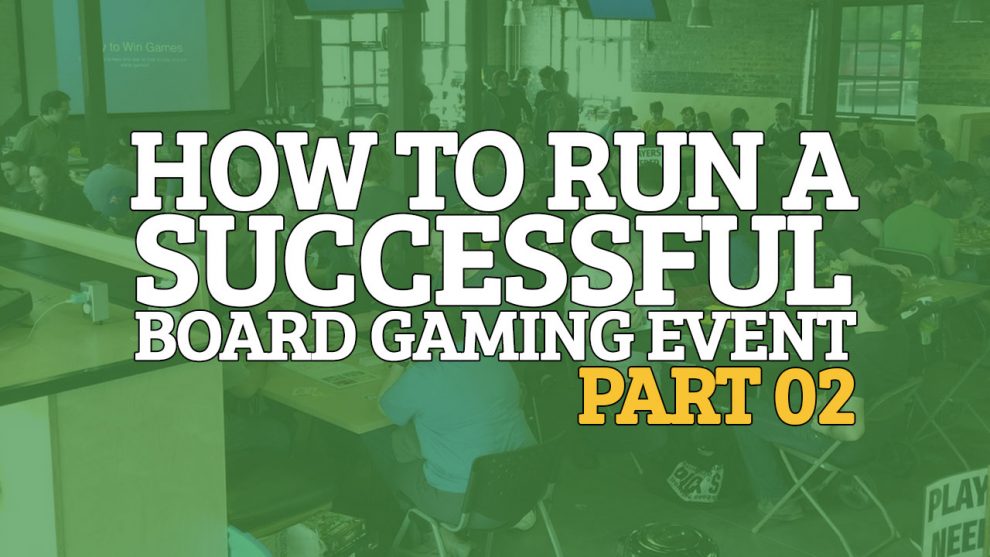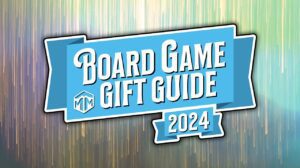In Part 01 of this article, How to Run a Successful Board Gaming Event – Planning and Preparation I discussed all of the things you’ll need to do, or at least consider, in the weeks and months leading up to your event. In this article, Part 02, I’ll go over what you’ll need to look at in the days leading up to the event, and the event day itself. Part 03 (Coming Down Off the Post Event High) covers the post event high and putting the ribbon on your board gaming event.
Now, let’s jump straight in.
Getting the Media Involved
If you read through Part 01, you’ll notice that I’ve already mentioned contacting the media: TV stations, newspapers, and other types of mass media outlets. But it’s worth mentioning again that you should follow up. For Nashville Tabletop Day I reached out to 3 TV stations and 2 newspapers and never heard a word from any of them. I followed up the week of the event by driving to their offices with flyers for the event. It probably just a coincidence that The Tennessean, Nashville’s largest newspaper, ran an article about my event after my visit. 😀
Don’t be pushy, but also don’t be bashful about getting the word out. Unless you receive other signals I feel like two contacts are appropriate. One email a month or so out, then another the week of your event. Especially if your local paper has a “things to do this week” section like The Tennessean does.
I was actually hoping I could garner interest from my local TV stations to come out and do a local interest piece, but that never surfaced. Perhaps next year now that they can see there’s interest…
Creating a Schedule
This probably should be done more than a few days out, if for no other reason than it’ll get your attendees excited. For Nashville Tabletop Day I originally just wanted all day open gaming. I was convinced by friends that having some type of schedule would be helpful. It helped that Z-Man Games offered to sponsor a Pandemic Survival Tournament for the small cost of sacrificing two tables worth of space.
The only other concession I had to a schedule was to clearly announce the way prizes, giveaways, and contests would work. If I decide to do this again in the future I’ll spend more time on a schedule, perhaps offering thematic tours of specific game types, or some sort of bracketed competition for well known games.
Keeping Your Attendees Informed
Depending on when you start allowing registrations for your event, some attendees might have signed up weeks or even months before your event. If your event is free, they could easily forget about it. But even if it’s paid event it can be easy for people to forget they registered and over schedule themselves. I strongly recommend an email to your attendees a few days before the event. A few things that you might consider including in this email.
- Links to your Twitter, Instagram, and Facebook accounts
- Directions to the venue
- Information about parking
- Information about nearby places to eat (if you’re not offering food)
- Event schedule
- Alternate directions in case of traffic, or other events
Just a note about the last bullet point. Nashville hosts a marathon every year which cuts through numerous portions of the city. The Monday before the event friends pointed out to me that the marathon was the same weekend as Nashville Tabletop Day. This caused me to scramble about poring over the race route, and detours to make sure we wouldn’t be affected. Thankfully we were not, but you should make a point to check for this type of thing and offer guidance to attendees so they don’t become concerned.
Just a note that online tools like Eventbrite.com make it very easy to send emails to your attendees, and in fact will automatically schedule emails to go out before the event with links to attendee’s tickets.
Publisher Demos
Do some research to find out if any game designers or publishing companies live in your city. It’s a good chance you’ll know this already, but it’s worth some time spent researching this information. You can also try to determine if any publishers have sales people who live in your city. If there are, then find out if those individuals would be willing to run a few demos. If they ARE, then make sure you advertise that fact in your marketing material. It gives your event legitimacy, excitement and gives attendees yet another reason to register.
Nashville Tabletop Day was fortunate enough to have Rick Schrand from Passport Game Studios running demos.
Fools Gold by @PassportGames with @RollinDDice #NashvilleTabletopDay @TableTopDay pic.twitter.com/TMwsqWRyFv
— Meeple Mountain (@meeplemountain) April 30, 2016
And David Lowry of Club Fantasci running Nevermore demos for Smirk and Dagger Games
Teaching Nevermore from @SmirkandDagger #NashvilleTabletopDay @intltabletopday @ClydeAMartin #boardgames pic.twitter.com/2dUxQkyDGZ
— Club Fantasci (@ClubFantasci) April 30, 2016
Proper Signage
Unless you’re using a hotel or actual meeting space, there’s a good chance you’ll need to provide signage for any number of directions, locations, points of interest, and policies. Among the signs you might need:
- Arrows outside the venue pointing to the entrance.
- Wifi credentials (if you’re including that).
- Bathrooms.
- Harassment or prize policies.
- Play to Win signup sheets
- Players Needed / Teachers Needed
Unless you’re a graphic designer, or have good experience with desktop publisher software, consider getting a volunteer to whip these up for you. They’ll probably look better, be easier to read, and take less time than if you did them yourself. Not to mention that you’re busy.
The Players / Teachers needed signs are going to require a little more effort. If you’re handy, and have the tools, you can knock out some of these signs with a little time and materials you might already have laying around. They can be as simple, or as elaborate, as you like but generally have a wide base, with a tall dowel extending upwards about 16 inches. Attach some laminated signs to the end and you’re good to go. If a player finds a game they want to try, but needs more players, grab a Player Needed sign and put it on your table. Have the players but want to fast track the learning stage: Grab a Teacher Needed sign.
I was fortunate enough to have 2 separate volunteers make signs for me. Here’s a few pictures of them for reference.
You won’t have to worry about needing players or a teacher at #NashvilleTabletopDay with these babies. pic.twitter.com/x7AJmNA25T
— Meeple Mountain (@meeplemountain) April 27, 2016
Hey @meeplemountain we sent out delegates to #NashvilleTabletopDay 😉 who are you sending to #Wellycon pic.twitter.com/t4t6ySpcJ3
— Wellycon (@wellycon_nz) April 30, 2016
A Brief Word About Harassment Policies
It’s unfortunate that some people in our hobby can’t tolerate the fact that other people don’t fit their mold of what a gamer should be. Games are all about having fun, and challenging yourself. Having a harassment policy available to attendees lets them know that it’s important to you, and that you expect no poor behavior. It will also give them no excuse should problems arise.
Consider posting a policy along these lines in at least a few places. Bathrooms, registration desk, etc.
Harassment Policy
Meeple Mountain is dedicated to providing a harassment-free and inclusive experience for everyone, regardless of gender, sexual orientation, disability, physical appearance, body size, race, gender identity or religion. Therefore, we do not tolerate harassment of participants in any form. Please familiarize yourself with our definition of harassment, and what we expect of attendees.
Harassment includes offensive verbal comments; sexual images in public spaces; deliberate intimidation; inappropriate physical contact; and unwelcome sexual attention. Participants asked to stop any harassing behavior are expected to comply immediately.
If you, as an attendee, feel harassed, you may inform the offender that you would like the harassing behavior to stop immediately. If you are not comfortable doing this, you may contact a staff member who will address the concern.
If you, as an attendee, are asked to stop behaving in a way that is interpreted as harassment, you are expected to stop, immediately. Arguing about the situation or trying to convince someone that your behavior is not harassment will not get you anywhere. Just stop. If you disagree that your behavior is harassment, that is fine, but the behavior should stop anyway.
If anyone engages in harassing behavior, organizers may take any action they, in their sole discretion, deem appropriate, including warning the offender or expulsion.
Staff will be happy to provide escorts, or otherwise assist those experiencing harassment to feel safe for the duration of the conference. We value your attendance.
Thank you
Meeple Mountain
Make sure your volunteers know about this policy and are willing to enforce it. If they’re not, tell then to find you for any issues. Be willing to follow up on any violations and act accordingly. Here’s to hoping you have no problems.
This harassment policy was cribbed from multiple sources including KublaCon and Geekway to the West. Thanks to both of you for supporting gamers of all stripes.
The Game Library
Next to your attendees the games are going to be the most important part of a board game event. It’s right there in the name after all. Making sure attendees have games to play is super important and not something to be taken lightly. Since we’re in the “just a few days before the event” it’s to be assumed you already have your library lined up, or have informed attendees they’ll need to bring their own games.
If you’re managing the library then here’s a few things to consider:
- How will you be organizing the games? Alphabetical? By play time? By box size?
- How do you plan on letting attendees check them out? Depending on the sophistication of your event, that might run from simply giving them your drivers license in exchange for a game. Or you might be able to let your attendees use their badge.
For Nashville Tabletop Day we grouped games into two main categories. Shorter, smaller games of 1 hour or less, and longer games of 1 hour or more. Depending on your level of organization consider creating a list of games that attendees can look at online. This would let them know in advance what they’re interested in and potentially walk in, and walk right out with the game.
The NAGA library even had custom barcode stickers on them. When scanned they took you to a page online for that game and let you see it’s history and details. Pretty awesome.
Running Play to Win Contests, Door Prizes, and Raffles
In Part 01 I talked about working with publishers to request prizes for your game day. Some publishers are willing to donate games outright, while other publishers love the idea of people playing their game to win it. This is called Play to Win (P2W) and here’s how I did it:
Create a stack of games off to the side. In my case all of these games were brand new and unopened. I had printed out a signup sheet which included the name of the game, and a place for users to provide their name and email address. Player A would grab the game and take it to a table, along with any other interested user, and play the game to completion. Upon bringing the game back they added their information to the sheet (only once for however many plays they had of that game). At some point later in the day you pull a random name from the list and that person wins the game. It’s an equitable system because only the people who care about the game can win it. Additionally the publisher might make a sale from the people who tried it and didn’t win.
Publishers also sent a number of smaller games…ones so small that that P2W didn’t make sense for them. Those games I divided up into groups and gave them away as door prizes. I purchased these raffle style tickets from Amazon and gave one part to each person as they checked in and kept the other part. Then every hour or so I stepped up to the mike and announced the winner(s). It was also a great way to recognize our venue and food sponsors, as well as gauge the mood of the crowd.
I originally wanted to group several games together into a grand prize, then sell tickets for it. I was then planning on donating the proceeds to the Monroe Carell Jr. Children’s Hospital at Vanderbilt on behalf of Penny-Arcade’s Child’s Play charity. Too bad pesky Tennessee regulations prevent anyone who is not a licensed 501(c) charity from doing raffles. Also, thanks to several friends who pointed this out before I announced, and implemented, it. It was nice not having to run the event from jail. 😀 Your state might have differing regulations, so look into if you’re interested.
Delegating Responsibilities to Your Volunteers
If you’re like me then you probably have a tendency to take too much upon yourself. You ARE running a gaming event after all. That’s fine to a point, but you need to be willing to let go and share the responsibilities…especially on game day. This means that when volunteers come to you asking what they can do, give them a task and move on to YOUR next task. Think positive and assume that they’re either going to complete the task, or come to you for follow up.
In my case I had several volunteers who truly went beyond what I could have expected. One of them completely managed the game library; including unpacking, sorting, shelving, and running the checkout table. She owned that slice of the event and did a stellar job. Thanks Jessica!
Another volunteer was my 10yo daughter. She asked up front to run the check in desk. In part I think she just wanted to use the iPad we had assigned to the task, but I dubiously said yes and let her do her job after telling her what I expected. She sat there for almost 5 hours happily checking people in, talking to them, giving out door prize tickets, and generally having a good time. As a dad I did check in with her to see how she was faring. Each time I did so she replied with a smile that she was fine. That’s her in the bottom left corner, what a trooper Noelle, thanks!
#NashvilleTabletopDay behind the scenes with our amazing volunteers. @TableTopDay .You all were amazing! pic.twitter.com/PfW6WoQ7Wt
— Meeple Mountain (@meeplemountain) May 2, 2016
Lastly a few other people just made themselves available for any task, no matter how small. Taking out the trash, helping set up lunch, getting more tables and chairs when we needed, and just generally being useful and awesome. Thanks Josh and Elijah!
The important thing to remember is that your volunteers are there to help make your event a success. It makes THEM look good to. So give them a task and let them shine!
Keep Up With Social Media
Social media is critical in the weeks and days leading up to an event, but it can also be immensely impactful the day of. As you set up, host contests, review the gaming hall, eat lunch, and even tear down…be posting tweets, photos on Instagram, and even Facebook posts. Create a unique hashtag for your event (consider including the year as well) and add that to every post on Twitter or Instagram. Make that hashtag visible everywhere in your venue, and encourage attendees to post their experiences throughout the day with that hashtag. This will give you an extra set of eyes: making it easier to see if someone’s having a tough time, or to revel in people’s happy posts about the good time they’re having.
If you’re doing contests, raffles, or door prizes take photos of the winners with their prizes. Tag the game publisher or creator of that prize to draw them into your day and give them visibility into their investment. post them to Twitter and Instagram to let people who couldn’t attend the event see what they missed. This will also set you up for next year when people search for information about your NEXT event.
Remind attendees about your Twitter, Instagram, and Facebook accounts at every chance.
Make Sure to Say Thanks to Everyone
As you interact with attendees or volunteers throughout the day, make a point to thank people for coming to your event. It’s a small thing and takes only seconds, but that could be the difference between someone leaving on a so-so note, or a high note. You never know when, or how, a thoughtful word could affect someone. Being kind doesn’t cost any extra, and it could make someone’s day.
Expect this to be true in reverse. If you’re a visible sort of organizer then people will recognize you and be coming up to you to say thanks on a regular basis. Be gracious and reply in kind and you probably just made sure that person will come to your next event.
Remind Yourself to Have Fun…No Really!
Throughout the day you’re going to be tired, really tired. I was up until midnight several nights in a row leading up to the event, then I got up at 6:30 the day of the event and didn’t return home until after midnight. It might be easy to let yourself get down or depressed about everything that you have to consider. At one point I even felt like I was completely alone…in a room full of people no less.
But for the most part, the event will run itself once you get it started. Gamers will game, volunteers will manage their spheres of influence, and you can take 5 minutes, or 30 minutes for that matter, and sit down and relax. You can even play a game.
Just remember that if you’re stressed out, that will come through to the volunteers and attendees. You don’t have to appear like you have it all together…but you do need to appear in control of the event. So take time if you need it…it might be the most important thing you do all day.
Wrapping Up
I hope your event is/was/will be as successful as mine. It’s a lot of work, and a huge time investment, but the feeling you get when you see people having fun and enjoying themselves at something you created is amazing. Look for Part 03 of this article soon, which covers the post event high and some final business.










